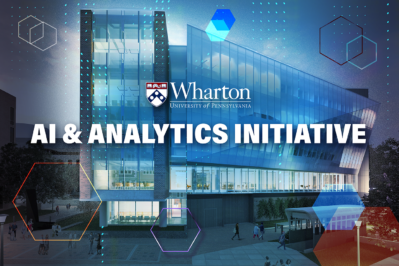School establishes Wharton AI & Analytics Initiative, announces first business school collaboration with OpenAI
 PHILADELPHIA, May 29, 2024—The Wharton School of the University of Pennsylvania today announced a major investment to drastically scale its research and teaching capabilities in the areas of artificial intelligence and data science. Under the umbrella of the new Wharton AI & Analytics Initiative, the interdisciplinary endeavor will encompass curricular enhancements, investments to advance new research, collaboration between industry and academia, and open-source resources to help shape the direction of generative AI.
PHILADELPHIA, May 29, 2024—The Wharton School of the University of Pennsylvania today announced a major investment to drastically scale its research and teaching capabilities in the areas of artificial intelligence and data science. Under the umbrella of the new Wharton AI & Analytics Initiative, the interdisciplinary endeavor will encompass curricular enhancements, investments to advance new research, collaboration between industry and academia, and open-source resources to help shape the direction of generative AI.
As part of the initiative, Wharton will begin providing ChatGPT Enterprise licenses to all full-time and executive MBA students this fall to further enable their exploration of generative AI. This innovation marks the first such collaboration between a business school and OpenAI, the company that makes ChatGPT.
“Exponential advances in AI are already changing how we live, learn, and work,” said Interim President J. Larry Jameson. “Like education, business must either lead this technological revolution or be led, and who better to help blaze the trail than the number one business school in the world? The new Wharton AI & Analytics Initiative is bold, leverages our strengths, and exemplifies Penn’s strategic leadership on great challenges of our time.”
Wharton has a long history of discerning the burgeoning challenges of the day and applying a data-informed approach to address societal needs. This latest initiative builds on Wharton’s extensive expertise in analytics and will significantly broaden the scope and impact of the School’s AI aspirations.
“Artificial intelligence is poised to fundamentally transform every sector of business and society, and the world needs reliable, evidence-based insights about its practical and responsible use today,” said Erika James, Dean of the Wharton School. “Business schools have a crucial role to play in understanding and advancing an AI-enabled world, and no school is better positioned to examine the multi-faceted dimensions of this evolving phenomenon than Wharton. That’s why we are investing heavily in areas that allow our faculty to navigate the avalanche of interrelated issues AI has broached.”
In support of this initiative, Wharton will establish two new funds to jumpstart efforts in research and teaching. A newly created Wharton AI Research Fund will provide faculty with critical resources to pursue projects exploring the intersection of AI advancement and modern business models, industries, and global economies. Additionally, an Education Innovation Fund has been developed to support curricular innovation by providing resources for faculty to augment, adapt, and reimagine how they incorporate AI into classroom instruction and course materials.
Building on the groundbreaking research explored in centers like AI at Wharton and the Mack Institute for Innovation Management, the initiative will further galvanize scholars across Wharton’s ten academic departments to explore AI’s impact on subjects like marketing, finance, investing, entrepreneurship, health care, and workforce productivity, while also considering AI’s ethical and accountability impact. The work will focus heavily on fostering collaboration between industry and academia to integrate a range of viewpoints and ensure the creation of value-added business learning and solutions.
The Wharton AI & Analytics Initiative will be led by Eric Bradlow, Vice Dean for AI & Analytics at Wharton, who is the K.P. Chao Professor, Professor of Marketing, Statistics and Data Science, Economics and Education. Professor Bradlow, who co-founded at Wharton the first-ever center on the application of data science to business, is an applied statistician with deep expertise in analytics and extensive experience engaging the business community.
“We aim to be the preeminent business school for student learning experiences, faculty exploration opportunities, and industry and academic thought partnership on AI and its impact on society,” said Bradlow. “This is a critical moment, and we are committed to creating and broadly sharing the novel scholarship the world needs to realize the tremendous promise of AI.”
The School is also building a new, open-source platform focused on the swift and iterative development of GenAI prototypes aimed at improving how society works and learns. By empowering learners through tailored AI educational experiences, the School aspires to shape the overall direction of generative AI while also mitigating its risks and dangers.
“Developing a fluency in AI and its impact on business decision-making is no longer an option, it’s a requirement to be competitive in any organization,” said Deputy Dean Nancy Rothbard. “We are once again answering society’s call to address the needs of tomorrow and we’re excited to provide our students and the business world with the tools and applicable knowledge they need to excel as we collectively confront the most transformative technology of our time.”
For more information about the Wharton AI & Analytics Initiative, visit https://ai-analytics.wharton.upenn.edu.
About the Wharton School
Founded in 1881 as the world’s first collegiate business school, the Wharton School of the University of Pennsylvania is shaping the future of business by incubating ideas, driving insights, and creating leaders who change the world. With a faculty of more than 235 renowned professors, Wharton has 5,000 undergraduate, MBA, executive MBA, and doctoral students. Each year 100,000 professionals from around the world advance their careers through Wharton Executive Education’s individual, company-customized, and online programs, and thousands of pre-collegiate students explore business concepts through Wharton’s Global Youth Program. More than 105,000 Wharton alumni form a powerful global network of leaders who transform business every day. For more information, visit www.wharton.upenn.edu.
###



